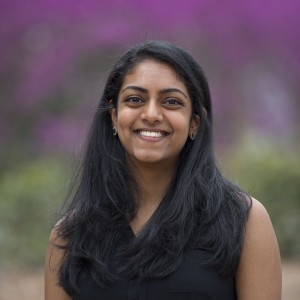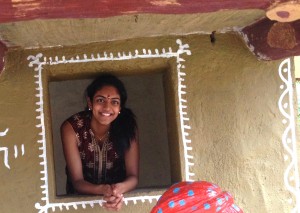Burch Fellowship enables Senthilnathan to conduct research in Tamil Nadu, India
April 19, 2016
When the Gillings Global Gateway™ invited an administrator from Aravind Eye Care System in Tamil Nadu, India, to present a seminar at the UNC Gillings School of Global Public Health, Aditi Senthilnathan was intrigued. The undergraduate student of biostatistics considered her family connections in Tamil Nadu, her fluency in Tamil, and her minors in chemistry and medical anthropology. She decided she had found a perfect fit for further study. Senthilnathan was keen to understand how the Aravind hospital chain was able to provide high-quality, low-cost ophthalmic care in a low-resource setting like Tamil Nadu.
For Senthilnathan, it is their unique workforce model that sets Aravind apart. The organization selects young women from rural areas, who are usually between 17 and 19 years old, and trains them for period of two years. Subsequently, the women are employed for three years as eye care technicians. These employees are able perform all necessary eye care duties apart from medical procedures, and they comprise about 60 percent of Aravind’s total workforce. During training, the women also learn about household management and are encouraged to save the money they will earn as technicians in preparation for future roles as housewives.
“Aravind says that these women are being empowered because they have a job and are getting money,” said Senthilnathan. “I want to understand that process of empowerment — why and how they’re being empowered — and also how it affects them, their communities, their families, and the hospital itself.”
With funding provided by the Honors Carolina Burch Fellowship, Senthilnathan will spend two months during the summer of 2016 at an Aravind hospital located in the city of Madurai, India. She will rely on her academic training in biostatistics and medical anthropology to direct her as she designs the study, collects and analyzes data about the women and their communities, and presents her findings.
Senthilnathan mused, “Will I do simple random sampling, or stratified or weighted sampling, based on where the women come from? It will be every exciting to do these things in reality. In school, you’re given all the techniques and then you choose the best one based on your situation. This will be the puzzle I have to figure out.”
Providing opportunities like this to apply students’ skills is especially important to Shrikant Bangdiwala, PhD, research professor in the biostatistics department at UNC Gillings. Bangdiwala has visited the Aravind facilities in India on various occasions, and it was this connection that enabled the presentation at UNC that inspired Senthilnathan.
“Students need to appreciate that biostatistics is not only data analysis or analytical methodology development, but also includes understanding and controlling the sources of variability and heterogeneity that come from the various design and conduct considerations of studies,” said Bangdiwala. “Exposure to settings with different environments, different constraints, different cultures, different resources, different ways of designing and conducting studies prepares our students to be better biostatisticians.”
Upon graduating in 2017, Senthilnathan hopes to attend medical school. In the meantime, she looks forward to being inspired by the innovative approach to eye care at Aravind Eye Care System.
“I’ll get that individual aspect, working with patients and seeing how factors such as poverty and inequality affect individual behaviors and individual health practices, but I’ll also understand the bigger picture through research design and biostatistics,” she said. “I hope to put that all together and see how the big picture plays out for individuals.”
This article was originally published in BiosBeat.
Gillings School of Global Public Health contact: David Pesci, director of communications, (919) 962-2600 or dpesci@unc.edu


